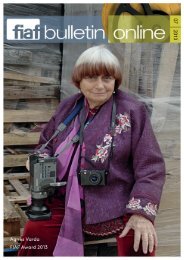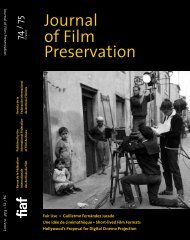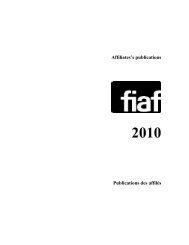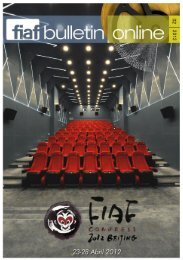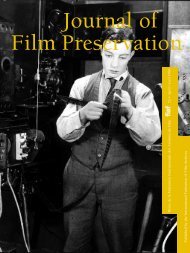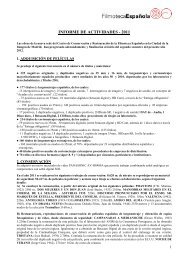Journal of Film Preservation N° 60/61 - FIAF
Journal of Film Preservation N° 60/61 - FIAF
Journal of Film Preservation N° 60/61 - FIAF
You also want an ePaper? Increase the reach of your titles
YUMPU automatically turns print PDFs into web optimized ePapers that Google loves.
cataloguing, acquisition by priority, but the smaller collections have<br />
not. They will first have to seek co-ordination and co-operation<br />
among themselves, and here the rôle <strong>of</strong> the regional audiovisual<br />
archives and their counterparts (depending on the particular<br />
province) may be a crucial one. Obviously, since they exist and are<br />
experienced, they could effectively co-ordinate the various individual<br />
projects within their regions and present them as a total regional<br />
project. That co-ordination will also imply consultation <strong>of</strong> the<br />
national institutions, as well as <strong>of</strong> the National archive branches in<br />
each province, ins<strong>of</strong>ar as they develop into more regionally oriented<br />
services. The Royal Association <strong>of</strong> Archivists has started a year or two<br />
again a Regional Working Group for Audiovisual Archiving, known<br />
under its Dutch initials NORAA, that already <strong>of</strong>fers itself as an<br />
instrument to take up exactly that responsibility. They do now have a<br />
solid base to work on.<br />
Some other co-ordinating activities have already been started. One<br />
priority area for NAA and <strong>Film</strong> Museum is the creation <strong>of</strong> a common<br />
standard <strong>of</strong> cataloguing, a common core thesaurus and eventually a<br />
common data bank for audiovisual media. This activity takes into<br />
account the foreseeable consequences <strong>of</strong> digitalisation, both for<br />
recent and for historical audiovisual documents. Third parties will be<br />
invited to participate in this project so as to develop a truly national<br />
audiovisual archives data bank that may at the end <strong>of</strong> the day provide<br />
users with references to other archival data banks in the country,<br />
though it is realistic to observe here that this is not to be achieved<br />
within a fortnight or so. A start has been made with the pr<strong>of</strong>essional<br />
education and training <strong>of</strong> audiovisual archivists when an educational<br />
institution known by its Dutch initials GO, submitted a project for<br />
specialist training in physical handling, preservation, inventorising<br />
and cataloguing <strong>of</strong> audiovisual materials. This project is supported<br />
financially i.a. by the Association and has also the support <strong>of</strong> the<br />
major archiving institutions. The Dutch Archive School in<br />
Amsterdam has scheduled to start in autumn <strong>of</strong> 2000 a pilot course<br />
at middle and higher level that will be designed to complement the<br />
GO training course, and is i.a. based on the UNESCO RAMP Study<br />
‘Curriculum development for the training <strong>of</strong> personnel at moving<br />
images and recorded sound archives’. Following the start <strong>of</strong> formal<br />
training courses one further development will be to establish<br />
qualification requirements and proper job description guidelines for<br />
personnel working in audiovisual archives.<br />
The 1999 inventory report gives an important and sustained<br />
momentum to audiovisual archiving in the Netherlands and therefore<br />
to archiving in general, as its effects reach well beyond the immediate<br />
issue <strong>of</strong> preservation itself.<br />
82 <strong>Journal</strong> <strong>of</strong> <strong>Film</strong> <strong>Preservation</strong> / <strong>60</strong>/<strong>61</strong> / 2000



